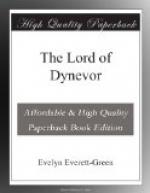Presently Llewelyn spoke again, this time with more strength, but still with the sullenness of despair:
“It was a mere skirmish on the banks of the Wye. We were in advance of the main body, and a party of English fell upon us. We did our best to sell our lives dearly. I thought I had sold mine when my time came, but I awoke and found myself beside the stream. Howel was lying upon me, stark and dead, and our prince a few yards away, with his own men round him. I do not think the foe knew whom they had slain, or they would have taken at least his head away as a trophy. I know not who took the news to our comrades, but they learned it, and dispersed to the four winds. I was forced to remain for some days in a shepherd’s hut till my wounds were somewhat healed, and since then I have been struggling back here, not knowing what had befallen our camp in these mountains. Am I the first to bear the, news, or has it been known before?”
“You are the first,” answered Wendot in a strange, blank voice. “We have heard nothing; we have been living in hopes of some triumph, some victory. We will let our fellows rest in peace one night longer. Tomorrow we must tell all, and decide what our action must be.”
“There is nothing more to hope for,” said Llewelyn darkly. “Our hope is dead, our last prince lies in a nameless grave. There is but one choice open to us now. Let those who will submit themselves to the proud usurper, and let us, who cannot so demean the name we bear, go forth sword in hand, and die fighting to the last for the country we may not live to deliver.”
It seemed, indeed, as if Llewelyn’s words were to prove themselves true; for no sooner did the news of the disaster on the banks of the Wye become known than the army began to melt away, like the snow in the increasing power of the sun. The chiefs, without a head, without a cause or a champion, either retired to their own wild solitudes or hastened to make their peace with their offended king; and only those who put honour before safety or life itself stood forth sword in hand to die, if it might be, with face to foe in defence of a cause which they knew was hopelessly lost.
And amongst this gallant but reckless little band were the three brothers of Dynevor, who, having once taken up the sword against Edward, were determined not to lay it down until the hand of death was cold upon each heart.
CHAPTER X. CARNARVON CASTLE.
“There has been a battle — desperate fighting. They are bringing the prisoners into the guardroom,” cried Britton, bursting into the royal apartments with small ceremony in his excitement. “Come, Alphonso; come, Joanna — let us go and see them. Our fellows say they made a gallant stand, and fought like veritable tigers. In sooth, I would I had been there. Methinks it is the last of the fighting these parts will see for many a long year.”




